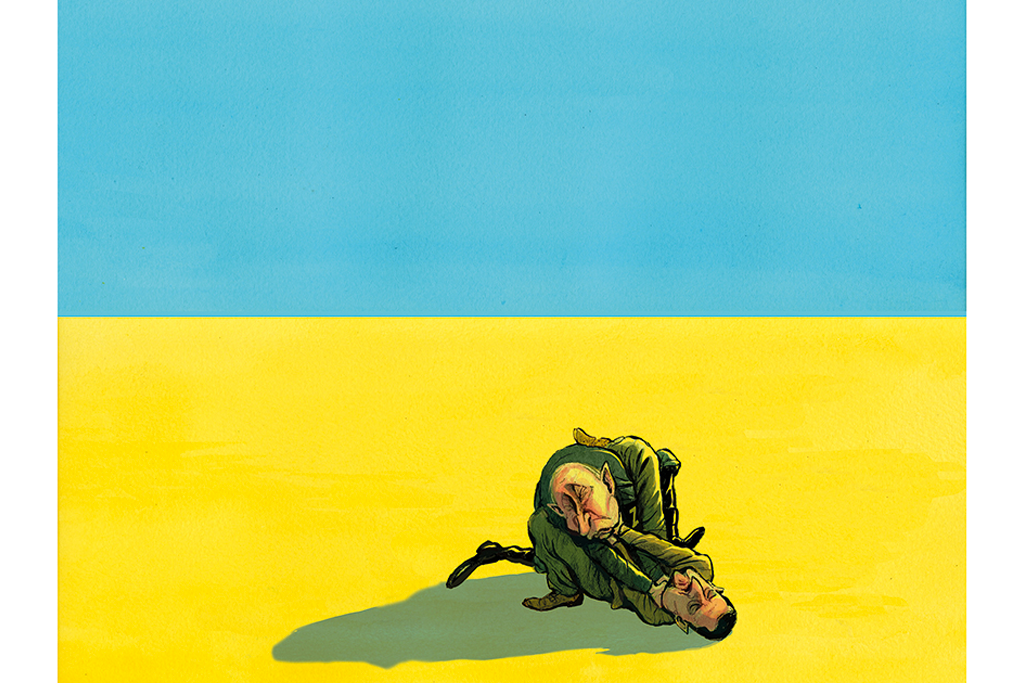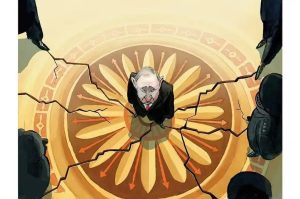Deciding whether Ukraine should eventually join NATO is hotly debated. There are good reasons to favor its inclusion, but not now, while the war is ongoing. It would transform the war into a conflict between nuclear-tipped Great Powers and vastly increase the danger.
Ukraine’s leader, Volodymyr Zelensky, is not happy with the uncertainty over his country’s membership. Actually, that’s an understatement. He is furious, according to reports. But that’s the decision taken by the allies meeting in Vilnius, Lithuania, and Joe Biden led the side urging delay.
In a tweet Tuesday morning, Zelensky said, “It’s unprecedented and absurd when [a] time frame is not set neither for the invitation nor for Ukraine’s membership.” Zelensky’s anger is understandable, given his responsibility to defend Ukraine. But Biden and NATO are prudent to not accept Ukraine as a member yet, and not just because Finland and Sweden are, or soon will be, new members.
The main reason for delay is that including Ukraine now, while it is fighting Russia, would immediately transform that war from one where NATO members are supporting Ukraine into one in which NATO members are fighting Russia directly. That’s a huge difference, and it carries enormous risks — unacceptable ones.
After all, Russia is bristling with nuclear arms and has zero chance of defeating NATO’s combined military might with only conventional arms. With that avenue blocked, Russia’s only path to any compromise solution that would allow it to save face and preserve Putin’s regime would be to threaten a nuclear strike, or perhaps carry out a first one and threaten more. Even if that were a limited strike on rural Ukraine, it would involve NATO powers in a nuclear war. The immediate damage would be coupled with the risks of catastrophic escalation.
Adding Ukraine to NATO now would also incorporate a new member with unsettled borders — militarily contested ones. True, almost no one (except a few Russian allies) recognizes the Kremlin’s conquest of the Donbas and Crimea in 2014 or its unilateral annexation of four Ukrainian oblasts in 2022. The world and international law recognizes those territories as part of a sovereign Ukraine. But Russian troops still occupy those regions, have established strong defensive lines to hold them, and must be expelled forcibly before Kyiv actually controls all of the land within its borders.
If Ukraine were added to NATO now, it would expect Western help in doing that. That means boots on the ground, fighter jets in the air and Western missile crews across the country. Some would die. Yet refusing to send them to a NATO member in danger would weaken the alliance’s deterrent posture elsewhere.
That credible deterrent is NATO’s greatest strength. It is based on two solid foundations:
- The allies’ combined military power and the interoperability of their forces, plus
- Their credible commitment, embodied in Nato’s Article 5, to treat an attack on one as an attack on all
That deterrent has worked. No state has ever attacked a NATO member’s territory or forces north of the Tropic of Cancer since the alliance was formed in 1949. The alliance has had its problems, but they have been different: “free riding” by European members, who knew they could skimp on defense because the US would foot the bill, and finding a strategic purpose after the USSR collapsed.
Putin’s aggression solved those problems. NATO’s purpose today is to deter Russian aggression against its members and support allied states, such as Ukraine, where Russian aggression has occurred. European free riding has diminished now that they grasp the immediacy of the Russian threat and the weariness of America in continuing to pay more than its fair share.
Those solutions are recent — and Putin has only himself to blame. How recent? Well, when he invaded Ukraine in 2014, President Barack Obama did nothing. That weakness undoubtedly factored into Putin’s thinking in 2022, since Biden had been Obama’s vice president. Biden’s own weakness and strategic incompetence also encouraged Putin’s aggression. Biden showed them in the shambolic withdrawal from Afghanistan and proposed defense budgets that declined in real terms. Putin also sensed weakness in the Biden White House as he built up forces on Ukraine’s border in 2021-22. The US did little to beef up Ukraine’s military to deter an invasion.
Throughout these years, including the Trump presidency, the West’s posture toward Ukraine’s NATO membership was the worst of all possible worlds. The allies publicly dangled the prospect of Ukraine’s “likely membership,” but slow-walked the process. From the Kremlin’s viewpoint, that combination meant it would eventually face a NATO member on its border — perhaps in a decade or so — but not yet. Better to act before that prospect became real, not only because it posed a military challenge but it posed a political one for Putin’s regime. A prosperous Ukraine, tightly bound to the rich West, would threaten Russia’s impoverished, insular stability.
Putin’s decision to launch an unprovoked invasion was the single most spectacular strategic blunder of the twenty-first century. It has yielded a bitter harvest, beginning with the hundreds of thousands dead and wounded on both sides. The invasion pumped new energy into NATO, expanded its membership to include states on his country’s doorstep (overturning the reason he gave for invading Ukraine), prompted major increases in European defense budgets, encouraged NATO members in Eastern Europe and Scandinavia (plus Britain) to lead the pushback against Russia — and ultimately endangered his rule by failing to win his own war of choice.
Still, for all those missteps, Putin has avoided the catastrophic one of striking NATO directly. He knows all about Article 5, so he knows it would bring the alliance into the war, with its men and women on the frontlines.
Putin has avoided that trap, and there is no reason NATO should step into it. That’s what it would do if it granted Ukraine membership while the fighting continues.

























